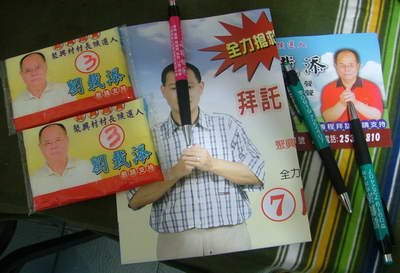
One of the KMT's overwhelming advantages come election time is its death grip on local level positions, the all-important hsiang chang, lin chang and li chang, the township and neighborhood chief positions. These individuals are responsible for all sorts of political and community decisionmaking and errand-running. For example, when it came time this year to update my wife's Taiwan ID and convert it to the new system, she handed it off to the local neighborhood chief, who took care of it for her.
The benefits of this system to the political party controlling it should be obvious. In the bad old days the local chiefs were part of the KMT's Leninist system of party interpenetration with society, monitoring and controlling local political behavior. Currently, since the overwhelming number of them are KMT and allied parties, they still perform monitoring functions for the former ruling party and its allies.
It's election time again and many of the neighborhood and township positions are up for grabs. I experienced the business end of this arrangement myself tonight as the candidates -- all of them, one after another -- made the rounds of my neighborhood, knocking on doors and handing out campaign literature.

The first group to the door shortly after dark, triggering much happy barking among my three large dogs, and no little trepidation among the candidate's entourage. I went out to see what the festivities were about. "Is the boss' wife there?" they asked me in Chinese, thus demonstrating that they knew I was married to a local and could speak the lingo. I scanned the faces but there was no one I recognized. I told them she wasn't home, and was immediately deluged with Stuff Printed With the Candidate's Face and Ballot Number. The pens were nice but there did not appear to be any concrete reason why I should pick their candidate over any other.
A half an hour later this experience was repeated, right down to the dialogue. "Is the boss' wife there?" This time I was not so off-balance, and wished them luck and shook hands with everyone. They addressed me as "teacher" which may have meant that they knew me, or simply figured since I was a Big Nose I must be an English teacher. Once again I was showered with the Stuff Printed With the Candidate's Face and Ballot Number. The pens were nice but there did not appear to be any concrete reason why I should pick their candidate over any other.
The third group did the same routine. "Is the boss' wife there?" I shook some offered hands and wished them luck. After they handed out the Stuff Printed With the Candidate's Face and Ballot Number (the pens were nice but there did not appear to be any concrete reason why I should pick their candidate over any other) one of them asked me why I hadn't been exercising on the hiking trails recently. I didn't recognize her either.

Of course, they are local fellows (local Goodfellows, they seemed), and their entourage was composed of people from the local neighborhoods, who had probably seen me around. But explaining it that way buries the larger point: it is precisely because candidates ARE locals with strong local connections through acquaintances, business partners, and extended families, that they have the antennae to keep abreast of everything happening in the local neighborhoods, and report it up the chain. The kind of information they can convey -- who votes for who, whose votes can be bought, whose votes need to be bought -- is priceless for a political party to maintain its power in Taiwan's merciless, and mercilessly expensive, election environment. Until the DPP makes significant inroads at the micro level, it will face an uphill struggle in both local and national elections.
[Taiwan] [DPP] [KMT] [elections]
5 comments:
These positions sound kinda like the Blockleiters of Nazi Germany:
- - -
Also colloquially known as a Blockwart (block attendant or warden), he was charged with planning, spreading propaganda and developing an acceptance to the policies of the NSDAP among the households (typically 40 to 60) in his area.
It was also the duty of the Blockleiter to spy on the population and report any anti-Nazi activities to the local office. This was helped by keeping files on each household.
- - -
Tim Maddog
These positions sound kinda like the Blockleiters of Nazi Germany:
- - -
Also colloquially known as a Blockwart (block attendant or warden), he was charged with planning, spreading propaganda and developing an acceptance to the policies of the NSDAP among the households (typically 40 to 60) in his area.
It was also the duty of the Blockleiter to spy on the population and report any anti-Nazi activities to the local office. This was helped by keeping files on each household.
- - -
Tim Maddog
"Stuff Printed With the Candidate's Face and Ballot Number. The pens were nice but there did not appear to be any concrete reason why I should pick their candidate over any other."
Why they always give pens and 衛生紙 *lol*
the pens are ok but the little packs of tissue paper are great and convenient to carry when you go out
I once talked with a DPP local congressman. He mentioned the importance of the micromanagement in Taiwan, and said that it's probably one of the most important reasons DPP lost in recent elections. He said that DPP came to government by fighting the corrupted KMT. People automatically support them for that reason, so DPP never learned to manage local business to the extent KMT did.
Then, DPP started running government and the reason of "fighting against corrupted government" disappeared. People no longer give them votes "automatically." DPP has to "earn" it but it seems that this part is ignored by the DPP core decision makers, and they are trying to swollow the consequence now.
Post a Comment